Y-12 Blog
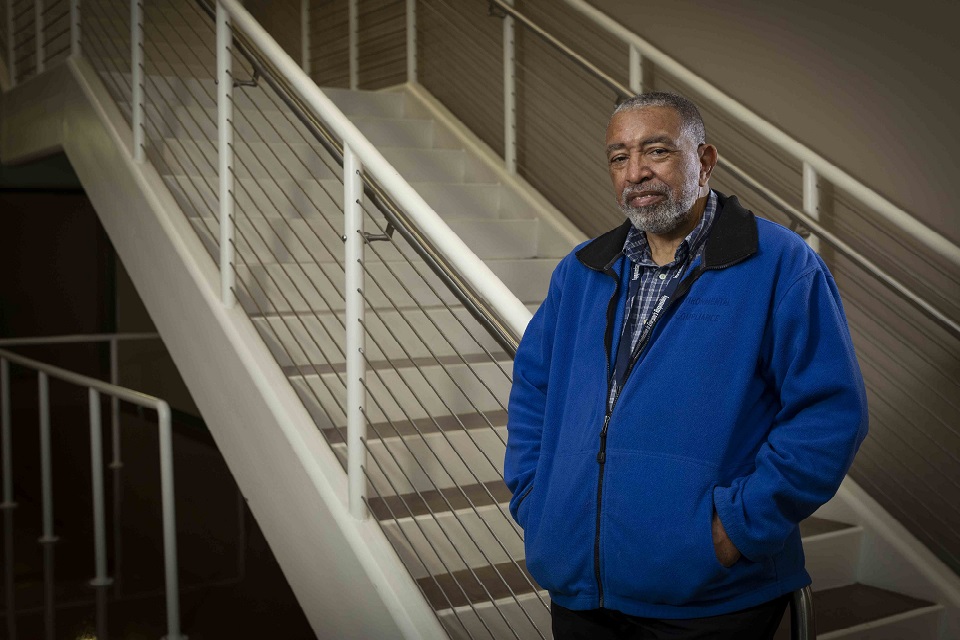
Wayne Carlton helps guide Y-12 to become a more recycling friendly workplace. Those efforts have earned him a Lifetime Achievement Award from the Department of Energy.
Take a few minutes and learn about Wayne Carlton, an environmental engineer at Y-12. All views and opinions are the employee’s own and do not necessarily reflect those of Consolidated Nuclear Security.
At home, Wayne Carlton handles the trash, with a little “help” from his wife.
“I have to separate everything,” he said. “She tends to put it all in one container.”
At work, Carlton deals with the waste of thousands of employees as an environmental engineer at Y-12, where he is a major contributor to the plant’s successful recycling and sustainability efforts. Because of his decades of work in those areas, he was given the Lifetime Achievement Award during the Department of Energy’s 2021 Sustainability Awards, which recognized outstanding sustainability contributions of individuals and teams at DOE facilities across the country. In addition to Carlton’s honor, Y-12’s Recycling Program was honored with the Outstanding Sustainability Program Award for its long term recycling efforts. In FY 2020, the program recycled more than 3.8 million pounds of materials, which resulted in $1.1 million in cost avoidance.
“I was humbly surprised,” he said about receiving the award. “As you work over the years, you do things because they need to be done and because you enjoy doing it. You don’t think about awards.”
Carlton’s career, which began at Westinghouse Hanford Company in Richland, Washington, spans 40 years. He came to Y-12 in 1989 as part of the Clean Air Program, in which he assisted operations personnel prepare air permit applications for submission to the Tennessee Department of Health and Environment.
“I have many jobs,” Carlton joked. Currently with the Y-12 Site Oversight Agreement Program, he monitors the development of information to fulfill the Oak Ridge Reservation Environmental Surveillance Oversight Agreement among DOE, the National Nuclear Security Administration, and the State of Tennessee. ESO assures Tennessee citizens that their health, safety, and environment are protected by DOE. In that role, he liaisons with government officials and external agencies. Also, Carlton is an auditor and inspector at treatment, storage, disposal, and recycling facilities, where he assesses their ability to meet requirements for handling, transporting, processing, and disposing DOE waste and material.
“I conduct audits at places where we send waste,” he explained. “It’s vendor verification. We have to make sure they live up to the contract and are compliant. A place can look really good on paper, but sometimes when you go out there, it’s like no, no, no. We don’t want things from Y-12 floating down the river.”
Those “things” could include a wide range of recyclable materials, from aluminum beverage cans and tires to cooking grease and toner cartridges. Also on the list are wood pallets, which are taken away monthly and ground into mulch.
Carlton serves as a system administrator of the site’s Environment, Safety, and Health directorate as well. In that role, he is responsible for the upkeep, configuration, reliable operation, and management of information technology desktop assets. Carlton advises and assists the Sustainability and Stewardship Program on technological improvements and the disposition of electronics. Also, in this position, he initiated and coordinated projects that integrated modern technology into various directorate operations. In addition, Carlton was integral in the replacement of the site-wide shredder and participated in the installation of BigBelly® solar powered, rubbish compacting bins, which provide a visible electronic warning when they are full.
At Y-12 for more than three decades, Carlton has seen the plant and society make major strides in recycling and sustainability.
“There’s been real progress the last 20 years,” he said. “Recycling has become more convenient now. If you make it more convenient, people will do it. It’s a mindset. If it feels like a chore, you won’t do it.”
Are you doing what you envisioned as a young adult? If so describe how you got here.
I wanted to be an engineer, so I did that. But I also envisioned myself making a real contribution. Didn’t want to be just a consumer.
What is your favorite aspect about your work environment? How does that aspect make you know the mission is being met?
Taking on a project and seeing it come to fruition. You will have pitfalls along the way, but there are always solutions for everything.
What work advice would you offer someone who is new to Pantex or Y-12?
Don’t be afraid to fail. Work outside your comfort zone. Learn something new. Take on a challenge. Never just go through the motions. Keep on growing. Also, don’t think things are going to come to you automatically.
What is your favorite outside of work activity and why?
I love landscaping, doing electrical work, any kind of do it yourself projects. Really enjoy doing things with my hands. The only thing is that my wife says I don’t do the projects fast enough.
What one thing would your coworkers be surprised to know about you?
When I retire, I want to teach people about computers, be a real advocate for them. I want to help bridge the gap between technology challenged people and computers, help them get rid of the fear they have of them.
Kyle Mitchell joins an impressive roster of Y-12 standouts who have been chosen for the 40 Under 40 list.
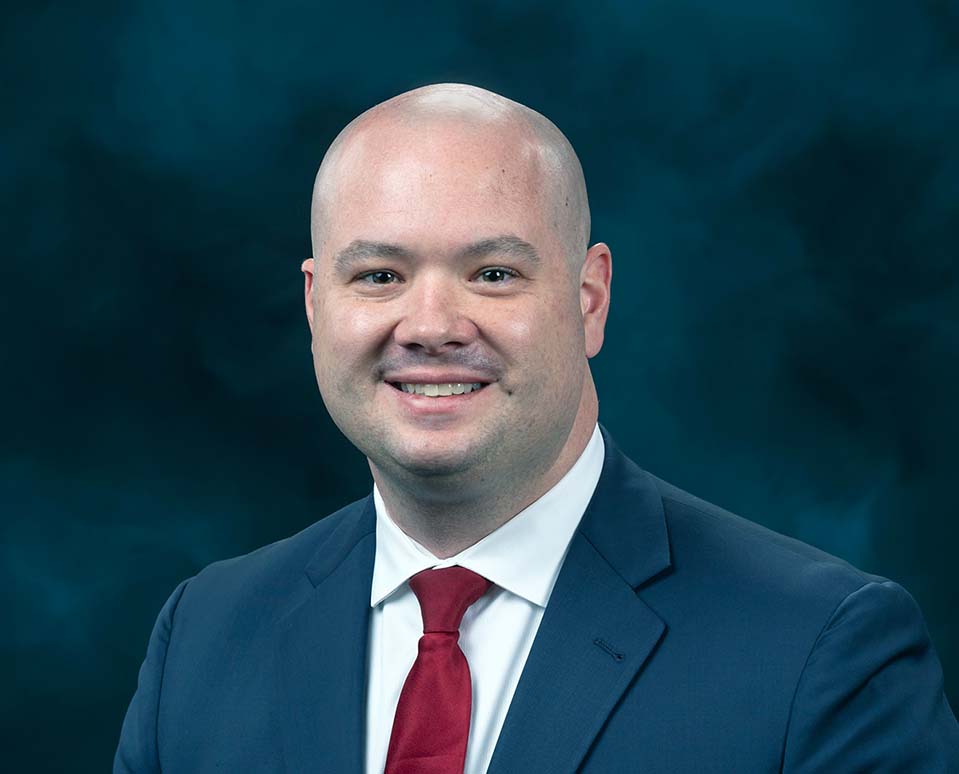
Kyle Mitchell. Photo courtesy of ORNL.
Kyle Mitchell is among the young professionals named to Knoxville News Sentinel’s and Knox.biz magazine’s 2021 40 Under 40 list.
“I was like, ‘Wow,’” said the 37 year old Y-12 employee about the selection. “This is pretty awesome. I know a couple of people who have been chosen for this, and they are really talented, accomplished people. This is really humbling.”
Mitchell is part of 40 Under 40’s 15th class, which, as the name suggests, is comprised of East Tennesseans under age 40. They are innovators in their industries and difference makers in their communities. Presented by Lincoln Memorial University, the class was featured in Knox.biz magazine and online at knoxnews.com.
He joins four other Y-12ers who have been singled out for the honor in recent years: Ashley Stowe (2014), senior manager, Engineering Technical Operation, Fellows program manager, and Minority Serving Institutions Partnership program manager; Cary Langham (2016), director, Cost Savings and Reinvestment for CNS enterprise; Reed Mullins (2017), senior director of Production Operations; and Katie Roberts (2018), senior technical advisor for Y-12 Production, who works with Mullins.
Since June, Mitchell has served as Global Security Analysis and Training program manager and is detailed to NNSA headquarters in Washington, D.C. as a Response Integration program manager for the Office of Radiological Security. In this role, he helps support the NNSA's efforts to prevent high activity radioactive sources from being used in acts of terrorism.
“It’s a really cool job,” he said. “I am really blessed to be here.”
Prior to joining Y-12, Mitchell was a senior security specialist at Oak Ridge National Laboratory, where he supported NNSA International Nuclear Security programs as a law enforcement subject matter expert. He also has served as director of security for Blount Memorial Hospital. There he led a staff of 20 sworn officers, security officers, and support personnel and created a regionally respected security department with state of the art technology.
In a 2017 stint with Pinkerton, Mitchell provided technical assistance on the development of a comprehensive and sustainable security regime for the first civil nuclear energy program in Abu Dhabi, United Arab Emirates.
“That was really incredible,” he said about the Middle East experience. “They were building a nuclear power plant, and I was training the UAE military.”
Before that post, Mitchell worked as a Protective Force instructor in Safeguards and Security at Y-12. He also developed and conducted training on firearms, advanced weapons systems, individual and team tactics, and physical protection systems.
He got his start as a police officer with the Maryville Police Department in 2004. He spent more than 11 years there and amassed an impressive record, which included appointments as a field training officer, traffic crash reconstructionist, homicide investigator, SWAT officer, and firearms instructor. In addition, Mitchell was selected as an instructor for the Governor’s Highway Safety Office for statewide training and garnered recognition as a 2012 and 2013 MADD (Mothers Against Drunk Driving) HERO Award winner, 2012 Officer of the Year, and recipient of the 2013 Outstanding Service Award.
While he is now a reserve police officer, Mitchell has also served as program manager for Shop with a Cop of Blount County, where 75 to 100 disadvantaged youth are given $200 and escorted by officers on a Christmas shopping spree. He still participates in the event.
“They spend a couple hours with us shopping,” he said. “It’s a great experience to see the smiles on the kids’ faces at the end of it. This is one of my favorite things to do.”
When he’s not at Y-12 or volunteering with the police department, Mitchell enjoys time with his family. His wife, Haley, is a CNS project risk manager for construction projects. The couple has 5 year old twin daughters, Kylee and Karson.
“We like spending time outside,” Mitchell said. “We like snow tubing, trout fishing, and we like to hike in the Smokies as often we can.”
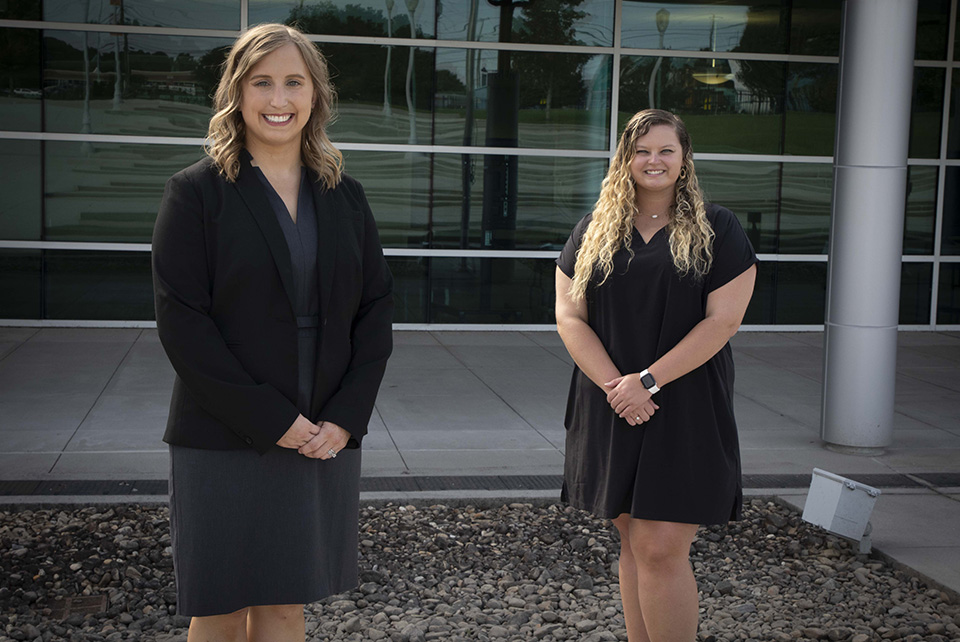
From left: Caitlin Hoch Nussbaum and Tori Smith are two of the University of Tennessee College of Law students who have been interning at Y-12.
For the past several years, the Technology Transfer Office has partnered with the University of Tennessee College of Law to give law students a unique opportunity to work with Y-12. The partnership is two fold — to help UT law students gain useful experience working in government contracting and intellectual property and to enhance the work of the Technology Transfer Office.
The partnership has been a huge success thus far, and its impact is highlighted in the overall efforts of Technology Transfer.
“Our relationship with the University of Tennessee College of Law is vital to the successful execution of the CNS Technology Transfer mission,” said Ashley Stowe, who leads the University Partnerships Programs and oversees the law interns for the Technology Transfer Office at Y-12.
The legal students work with inventors, research prior art, and conduct market surveys that enable Y-12 to translate new ideas into patentable language to support the best embodiment for submission to the patent office. They also inform Technology Transfer’s decision makers on which disclosures to pursue and help guide the marketing and commercialization strategy.
Stowe also notes that the program focuses on the strengths and interests of each individual during their time in the program.
“We leverage the students’ undergraduate discipline — whether it be an engineering discipline or business degree — to garner their enthusiasm in a particular area and maximize their intern experience,” said Stowe.
Caitlin Hoch Nussbaum is wrapping up her legal internship with Technology Transfer. Already an environmental engineer with more than 12 years of experience working with the U.S. Army Corps of Engineers, she took an interest in patent and intellectual property law.
Upon joining the team in May 2021, she immediately jumped in and began working on projects. Hoch Nussbaum has enjoyed being able to make an impact with her work, while also showcasing skills that will help in her future career endeavors.
“Being able to work on a variety of projects — patent searches, market surveys, contracts, research prior art, office council reviews — has been such an incredible experience,” Hoch Nussbaum said. “I’ve had the opportunity to make recommendations on contract changes and see them actually be put into place.”
The Technology Transfer team makes an effort to ensure all interns receive real world experience that will extend beyond their internship experience and throughout their careers. For Hoch Nussbaum, this has helped solidify her aspirations to continue a career in intellectual property law.
“I’ve been able to see how an initial idea translates into application and have a hand in each part of the process,” said Hoch Nussbaum. “Gaining experience in this field and being a small part in helping bolster their intellectual property portfolio and hopefully bringing in more business opportunities for Y-12 — it has been a remarkable experience.”
George Kuney, professor of law and director of the Clayton Center for Entrepreneurial Law at UT, sees the value in this program for his students each and every year.
“This program exposes our students to real world, high tech law and business issues while also exposing them to compliance regimes that cannot be duplicated in the classroom,” Kuney said. “Every single student that has gone through the program has commented on the depth and breadth of knowledge gained in this immersive experience.”
The value and impact, both for Y-12 and UT, proves to be invaluable as this program continues to grow. The Technology Transfer Office welcomed an additional law intern, Tori Smith, for the fall semester. She completed her internship in December. Smith received her undergraduate degree in supply chain management, and she’s particularly interested in copyright law. She saw this as an opportunity to learn and grow in the field she wants to pursue.
“It’s real world experience and exceptionally valuable,” Smith said. “I would highly recommend it to any law student.”
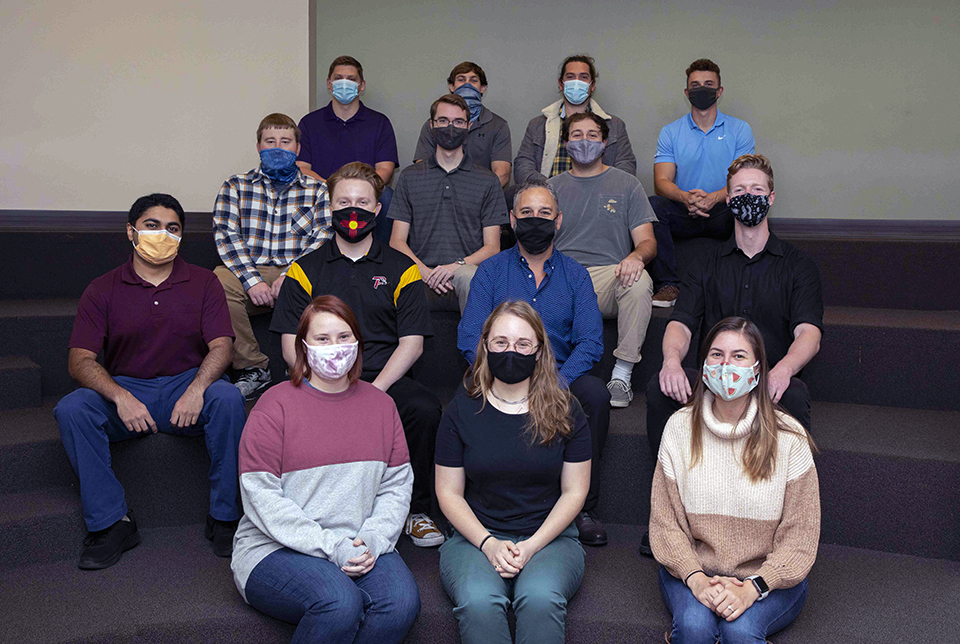
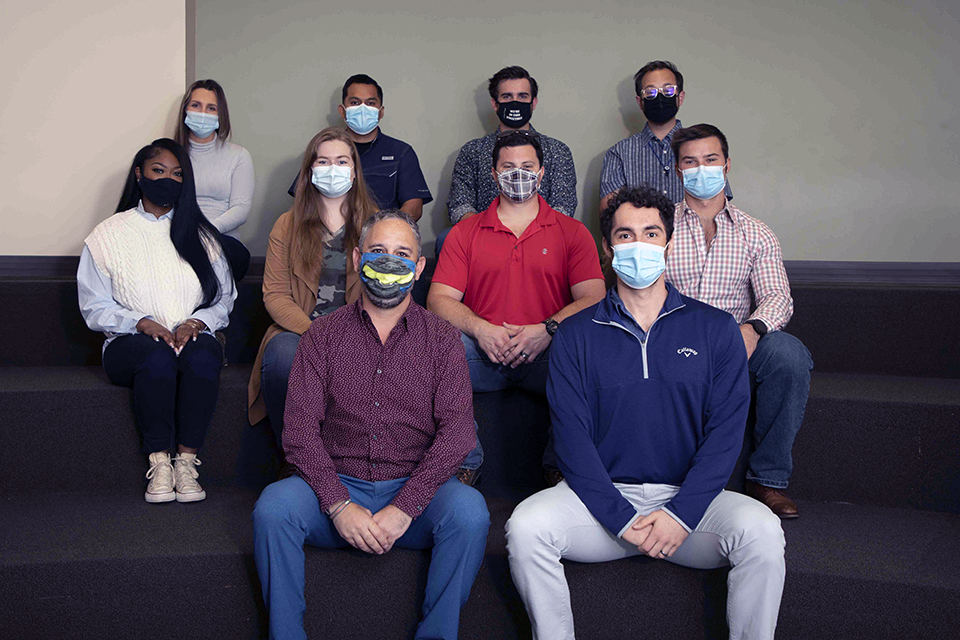
Career Opportunities for New Engineers, also known as Career ONE, is an engineering rotation and development program for Pantex and Y-12 engineers who have recently graduated.
The job rotation program gives the new employees the chance to rotate into different engineering programs at Pantex and Y-12. The rotations are available for the first two years of their career. Working in different engineering disciplines in 4- to 6-month increments allows them to gain insight into each field so they can better determine which career path is the best fit. Workshops and training sessions further expand their knowledge and technical skills. Plus, they have access to learn about unique manufacturing and processes.
Michael Ellis, Career ONE director, oversees the program. He believes that Career ONE engineers have a positive impact on the sites’ missions by bringing new perspectives and new eyes to the programs while they gain experience in the special work that takes place at the production facilities.
“This rotation program helps the newly hired engineers experience different areas within engineering. They get to learn about the job and what it means before being hired in that specific department of engineering permanently,” he said. “This year, we have 14 new engineers at Y-12 and five at Pantex. The program is not trial and error, as each of them have the opportunity to be hired full time after the rotation,” said Ellis.
Pantex started its Career ONE program with the help of Raquel Barrera-Chavez, section manager for civil, structural, and design engineers.
“Because of the value and the importance of the program, both to the engineers and the production facility, I volunteered to help Mike with Career ONE at Pantex. I know how much having a program like this would have helped me in understanding what I was walking into before I started, and it would’ve given me a better idea of what I’d be doing,” said Barrera-Chavez. “I wanted to be part of helping those after me have that option. Now I help set up the career rotations for the new hires.”
Barrera-Chavez is transitioning to a new role herself, civil, structural, and architectural manager for Projects Engineering. Steve Carter will be the new Pantex Career ONE contact.
There are several requirements to qualify as a Career ONE engineer. Julie Huff, senior director of Engineering Technical Operations at Y-12, said, “The engineers must have an accumulated GPA of 3.0 in order to be accepted into the program. Once they are hired, they are rotated in different engineering areas. A lot of times when people graduate, they are unsure of what specialty they want to do. By having the rotation program, they get to see what they enjoy, and it helps managers do a trial run to see who fits which group. This program is such a strong aspect to engineering at both sites.”
Previous Career ONE member Erika Delaney, now a weapons product engineer at Y-12, was hired in April 2018 and completed the program in 2019.
“I found out about the program when I attended the University of Tennessee’s career fair,” said Delaney. “Being a part of Career ONE was a great way to learn more about Y-12. I got to attend weekly meetings, network, make friends in my same area of interest, and I tested out different things that I might not have even considered before being a part of Career ONE.”
Once Delaney completed the program, she was able to give back by being a mentor for Career ONE. She is still an available contact to new classes.
Katie Romba, a Career ONE Class of 2020 grad and now a mechanical engineer in Y-12 Development, also learned about the program at her school. “I found out about the opportunity at the Clemson University career fair,” Romba said. “I love that this gave me the chance to see what department would be the best fit for me. It challenged me and helped me figure out how to complete projects on my own and learn how to take ownership of what I was doing.”
Romba completed the program with her husband, David, and they both remain a part of the group by attending meetings and serving as mentors for new members.
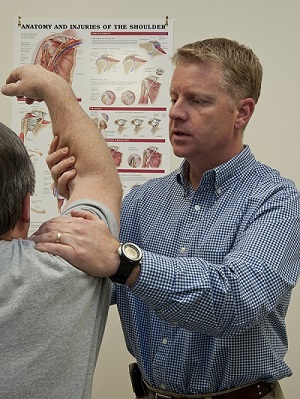
Shoulders are common problem spots for physical therapy patients. Y-12 physical therapist Gary Hall examines the arm of a client.
Not many employers offer on-site physical therapy, so let’s meet the LiveWise physical therapists and physical therapist assistants who help improve the health of Pantexans and Y-12ers.
For Y-12 physical therapist Gary Hall, sitting for long periods should come with a Surgeon General’s warning.
“Sitting is the new smoking,” he said.
The American Physical Therapy Association acknowledges people’s sedentary tendencies. The organization focuses on the importance of physical activity and how physical therapy helps people to move.
According to the organization, inadequate physical activity adds $117 billion annually in health care costs in the United States and results in reduced quality of life for millions of Americans.
“We are more sedentary than we have been,” said Pantex physical therapist Cody McClary. “We’re not getting out as much. We’re not walking with the dog or the family. We’re not exercising the ways we should. Exercise helps our muscles stay strong and loose.”
One reason for the reduced activity is the COVID-19 pandemic. It has changed how people live, which includes how they work. Like many companies across the country, teleworking from home has become the norm at Pantex and Y-12. This means many hours sitting at a desk, kitchen counter, or dining room table, staring at a computer screen. Or in Hall’s case, on the couch.
“One day I was at home teleworking,” he recalled. “I’ve got my laptop, knees hunched up. My wife walked in and said, ‘It’s a good thing no one can see you right now.’ To say the least, I was not at optimal positioning.”
Slumped shoulders while seated for work is an example of improper positioning.
“When you sit at the computer, the head naturally migrates towards the monitor,” Hall explained, “which causes the shoulders to round over. You have to pull your shoulders back. This will help strengthen the muscles between the shoulder blades.”
Rounded shoulders can cause back issues, neck pain, and rotator cuff problems.
“More Pantexans ask about their wrists and hands,” McClary said. “They are feeling numbness and tingling, pain in the wrist. It’s because of bad ergonomics.”
To help alleviate discomfort from extended sitting, the prescription is to simply move.
“Take as many breaks as you can,” McClary suggested, “This will help get the blood flowing.”
He also recommended stretching to help relieve the body. For the hands, McClary likes to use stress putty, while making a fist, then extending the fingers. Also rubber bands can be placed around fingers to create resistance, strengthening them.
For the shoulders and back, McClary advocates the “field goal” stretch, where the hands are placed on each side of a doorway, while slightly shifting the weight forward. Also helpful are big and small shoulder circles, forward and back.
In addition to helping people deal with teleworking aches and pains, the physical therapists are helping with those recovering from COVID-19.
“Many are COVID long haulers,” Hall said. “The main problem is deconditioning. They find out they are unable to do certain activities when they try to go back to their normal work routines. Everything doesn’t return at the same rate. There’s weakness in the trunk and spine. They’ve lost strength in the peripheral muscles in the arms and legs. Some have lost the ability to maintain a posture to even type.”
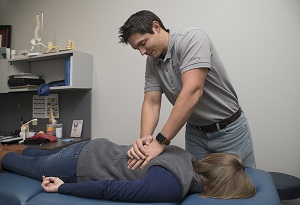
Pantex physical therapist Cody McClary applies pressure to a patient’s back to help alleviate discomfort.
McClary added, “The heart and lungs were so stressed [during the bout with the virus], walking from the parking lot is extremely difficult. I’m sure we’re going to see more and more patients with these issues.”
Also, the therapists may experience a surge in seasonal patients.
“Fall is big for physical therapy clinics,” Hall said. “People are very task focused doing yardwork, like raking and bagging leaves, and they think ‘I have this entire yard of leaves; I need to take care of it today.’ A lot of times they don’t use the proper mechanics and may not have the proper core strength, which causes them to strain something and overuse muscles.”
McClary added, “Core strength is the most important aspect of your body. The core is the first group of muscles activated when you do anything. It really needs to be the strongest muscle group. A strong core protects the discs and the nerve structures around those discs in the back and can prevent injuries.”
In addition to tackling ailments due to teleworking, COVID-19, and weekend activities, the physical therapists treat post surgical patients who have undergone such procedures as knee and hip replacements, carpal tunnel surgery, heart surgery, and more.
“It can take six months to a year to recover from a surgery,” McClary said. “That could include three or four months of therapy, maybe even six months.”
Physical therapy is a free service for employees at both sites. However, a medical referral is required to receive treatment. All physical therapy evaluations and appointments must be on the employee’s own time.
“Working with people is very cool,” Hall said. “It’s really gratifying when you can help patients achieve their best.”
